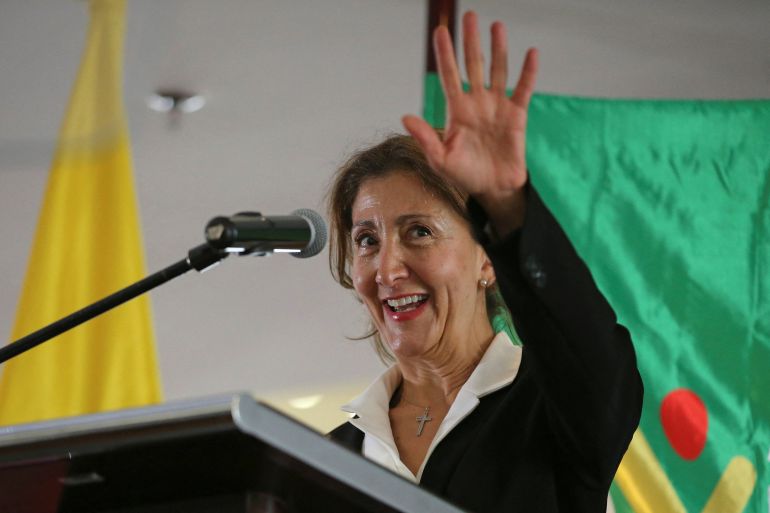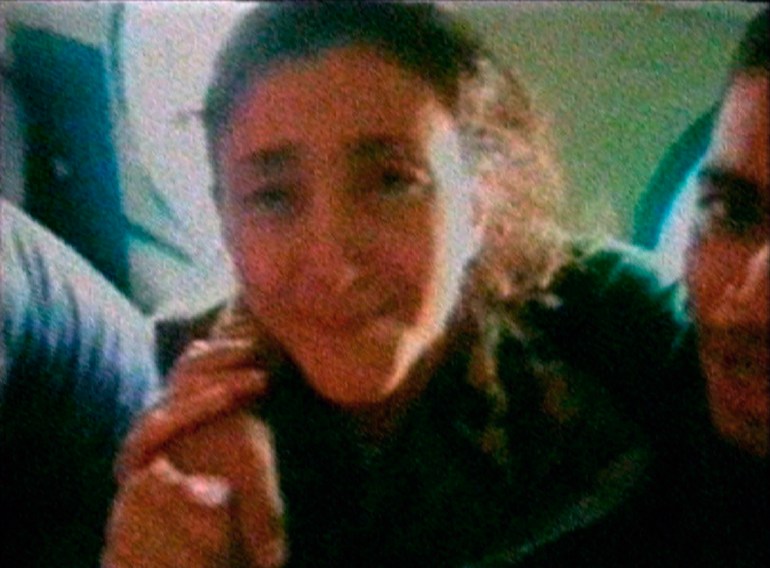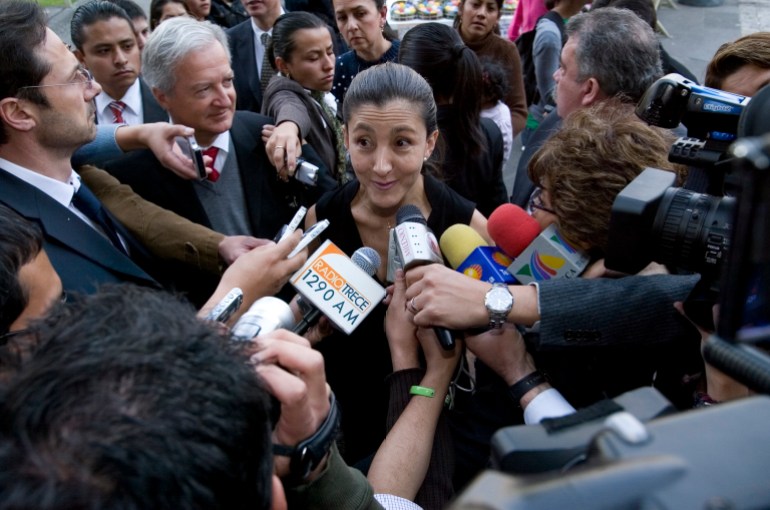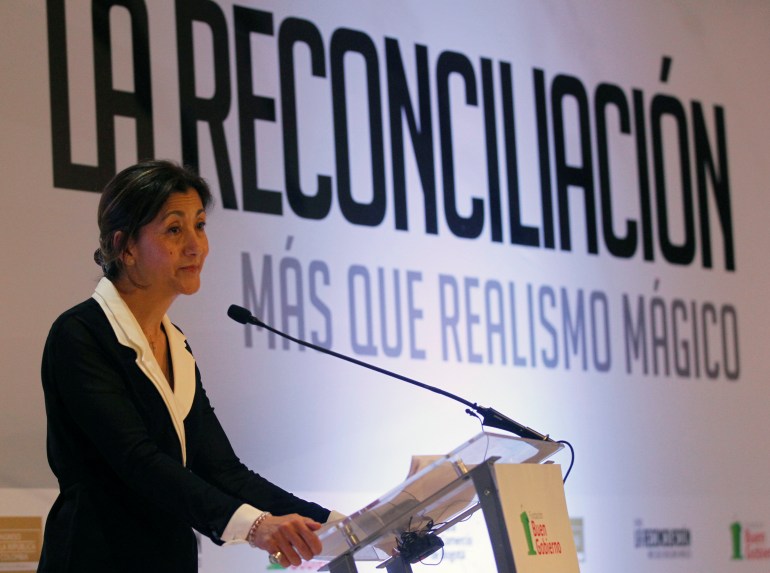Once kidnapped by the FARC, now aiming for Colombia’s presidency
Ingrid Betancourt tells Al Jazeera she has what it takes to become Colombia’s first female president, but not everyone agrees.

She is an enduring symbol of a 52-year-long rebellion that killed more than 260,000 Colombians and displaced millions more.
Ingrid Betancourt was campaigning to become the first female president of her native country when she and her entourage encountered a checkpoint manned by a group of rebels belonging to the Revolutionary Armed Forces of Colombia (FARC) movement on February 23, 2002 in a remote corner of southwestern Colombia.
Keep reading
list of 3 itemsColombia can’t resume coca aerial spraying for now, court rules
Armed group attacks UN convoy, burns two vehicles in Colombia
The armed fighters instantly recognised the high-profile legislator and detained Betancourt along with her campaign manager. The senator’s capture marked the beginning of a six-year ordeal that endangered her health and witnessed physical mistreatment of the mother of two until a daring and elaborately planned rescue operation freed a gaunt-looking Betancourt in July 2008.

Fast forward to today. The now 60-year-old Betancourt announced her decision last month to seek the nation’s highest office for a second time as a leading light in a recently formed coalition of Colombia’s centrist political parties.
During a speech at a hotel in the national capital of Bogota to launch her presidential bid, the former hostage pledged to crack down on the country’s chronic corruption and cast herself as the candidate of reconciliation who can bridge the deep divisions polarising millions of Colombians.
“I am here to finish what I started,” she declared on January 18. “We are going to leave behind this culture of mafias, violence and lies [so] that all of us can have a true democracy.”
Best known outside Colombia for the many years she spent in captivity, Betancourt has publicly supported the 2016 peace agreement that ended Latin America’s longest civil war and gave many FARC members amnesty. She has opposed calls for the removal of two former FARC commanders from their seats on the upper chamber of Colombia’s national congress who face charges of committing crimes against humanity.
But she also feels that under the terms of the peace agreement, many demobilised FARC leaders have yet to be held fully accountable for the atrocities that were committed under their watch.
“As a victim of the guerrillas, I supported the peace process because I wanted to guarantee that no other Colombians be subjected to what I was subjected to,” Betancourt told Al Jazeera in a telephone interview last week. “But the victims want the truth, they want an understanding of what happened and what led [the rebels] to treat us like animals.”
In declaring her candidacy, Betancourt has joined an already crowded field of more than 20 aspirants vying to succeed Colombia’s lame-duck president Ivan Duque when his term of office ends in August.
The presidential election is scheduled for May 29, and if no candidate gets a simple majority of the ballots cast then a runoff election will be held at a later date.

The initial weeks of her campaign have been anything but auspicious. Within days of throwing her hat into the ring, Betancourt publicly called for the expulsion of two politicians with links to the country’s controversial former President Alvaro Uribe from the Centro Esperanza coalition whose presidential nomination she was seeking.
She delivered the ultimatum during a televised debate on January 26 and set a deadline for their banishment from the campaign of a fellow coalition candidate by the following evening. When that deadline came and went without any response to Betancourt’s demand, she abruptly announced her withdrawal from the coalition and said she would continue her presidential quest as an independent candidate.
She staunchly defended her decision to leave the ranks of the Centro Esperanza coalition. “We in Centro Esperanza had united against corruption and we pledged not to accept support from any politician who came from these criminal political machines,” said Betancourt, referring to the once-formidable array of forces commanded by Uribe during his two-term presidency that ended in 2010.
“I was very adamant about not accepting this breach of our principles and rules.”
Betancourt’s hasty move may end up hurting the group that had been seen as the best centrist hope of beating Uribe’s right-wing heirs.
The coalition founded last June was betting its nominee would also fend off the current frontrunner in the polls, former Bogota mayor Gustavo Petro. He has been waging an almost nonstop campaign on a left-wing populist platform since he finished second to Duque in the country’s last presidential balloting in 2018.
Some political analysts have described Betancourt’s go-it-alone approach as a non-starter and express concerns that her very public divorce from the Centro Esperanza coalition may have inflicted irreparable harm on its own prospects for making it into a second-round runoff vote later this year.
“The damage she has done is great,” said foreign policy analyst and former National Endowment for Democracy fellow Laura Gil. “I’m not sure the coalition will recover from this.”
Betancourt dismisses such gloomy assessments and insists that even as an independent, she is the lone candidate who can halt the Petro juggernaut to Bogota’s Casa de Narino, the local equivalent of the White House.
“Today’s elections show that the frontrunners a year before the balloting are not the ones who actually win the vote,” she told Al Jazeera.
“Politics are dynamic, and I’m attuned to the will of the Colombian people who really want to get rid of corruption. I’m the only one who can defeat Petro, who represents a danger to the country’s economic system.”
As a congresswoman and later senator in the late 1990s, Betancourt acquired a reputation for poor judgement in her choice of political allies and a tendency to act like a one-woman band, said Malcolm Deas, a British historian specialising in Colombia.
Others pointed to the absence of a political or social supporting cast needed to mount a serious bid for the presidency. ”She’s been away for a long time, and she has no structure to support her candidacy,” said Gil. “As a lone ranger, I don’t see how she can win the hearts of Colombians.”
Betancourt has lived in France for most of the past 13 years after regaining her freedom from her FARC abductors and only recently returned to Colombia. Some seasoned observers of Colombian politics have said the effects of that physical absence occasionally reveal themselves.
During a live interview with one of the country’s leading television networks earlier this month, Betancourt was unfamiliar with the reputation of some prominent Colombian politicians and said she would raise the age to qualify for a government pension to “around” 60 years of age when it already stands at 62 for male citizens.
“On the surface, Ingrid represents reconciliation broadly as someone who has been hurt and victimised,” said Sergio Guzman, director of the Bogota-based Colombia Risk Analysis consulting firm.

“But she essentially showed she has no idea where she stands and doesn’t even know who some of her potential allies and opponents are.”
White men have exclusively ruled Colombia ever since it gained its de facto independence from Spain in 1819, and the return of Betancourt to the presidential debate stage encouraged many of her countrywomen to believe that a major milestone for female political empowerment might be in the offing.
That possibility seems unlikely, with the latest poll by the Centro Nacional de Consultoría opinion marketing firm and the Colombian weekly magazine Semana showing Betancourt running a distant third with a mere seven per cent of support among survey respondents. She maintains that such pessimistic talk is premature. “To say I have no chance is to have a crystal ball in trying to guess what will happen in the next four months,” said Betancourt, referring to the presidential vote scheduled for May 29.
But others say she lacks the political skills to navigate her way to the presidency. “She went through a terrible experience, she wrote a good book about it, and the way she came out of it was admirable,” said the historian Deas.
“But I distinguish between Ingrid as a person and Ingrid as a politician. She has no talent for compromise, and she is naive in thinking that this sort of lone ‘clean-up politics’ venture will get anywhere. Colombia has lots of politicians, it is idle to think that you can have politics without them – and a winner in Colombia needs all sorts of support.”